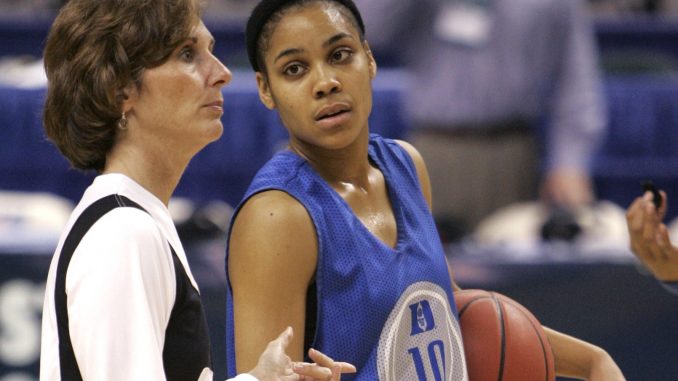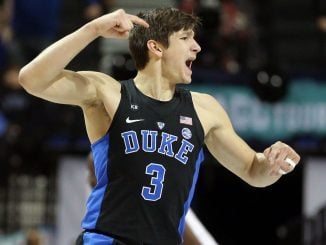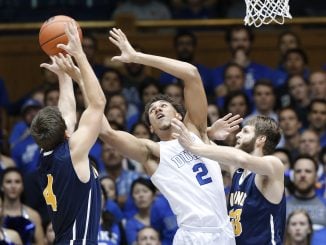
Lindsey Harding has been competing with the boys in athletics since she was growing up.
“Girls were playing with dolls,” she said. “I was playing tackle football.”
As a kid, Harding was involved in everything from volleyball to gymnastics in organized sports, as well as whatever pickup sport the kids in her Houston-area neighborhood were playing.
When the Houston Comets arrived, her father got season tickets to the WBNA, and Harding found her home.
“The first season, first home game, I saw the arena,” she said. “I saw those women out there playing, and I said, ‘This is what I want to do.’”
She gave up track, which also could have gotten her a college scholarship, and arrived at Duke in 2002 as a freshman point guard who wasn’t sure she belonged.
“I was there with the greatest to ever play at Duke,” she said. “Alana Beard — we had a player who was All-American and would dive on the floor for the ball every time. I came in as a freshman and said, ‘OK, this is the level.’”
It was only natural to defer to Beard, but head coach Gail Goestenkors needed her point guard to make it clear who was in charge.

“I came in as a point guard who wouldn’t say anything,” she said. “I was quiet. She probably doesn’t remember this, but she would say, ‘When we’re in practice,’ which was three hours back then, maybe three and a half hours. ‘If I hear silence out of you, if you’re not saying anything, if I turn around and you’re not saying anything, you have to run two suicides, back-to-back.’
“Nothing’s happening on the court. They’re just dribbling the ball down the court, and she’s like, ‘Harding, why are you not talking? Run.’ I would start saying, ‘Good job! Go! Run!’ I would make things up. But that forced me to communicate. To talk. Then I started talking through plays. Then I started leading. Then she couldn’t shut me up. It took me a while.”
Harding doesn’t think she’d be where she is today if not for Goestenkors.
“She pushed me,” Harding said. “I always worked hard, but she pushed me past that limit. I didn’t know I could go any further, but the whole team was like that.”
Goestenkors was also the first person to tell Harding that coaching could be in her future.
“I told her she was crazy,” Harding said. “I’m never gonna do this. I never planned to do this. But she put it in my head.”
After her WNBA career, Harding did indeed become a coach, but probably not where Coach G envisioned.
Harding is coaching at the highest level of the sport. Last year, she was hired by the NBA’s Sacramento Kings as the player development coach. She’s one of the first women to get a coaching job in the NBA, which takes a certain touch.
“It’s a collaborative approach,” she said. “I never come in and say, ‘You have to do this, this and this.’ It’s, ‘This is what’s expected. This is what we’re going to look to you for. Let’s get together. What do you want to work on?’ Sometimes, you have to give a little bit. We try to move as one. Coming in and saying, ‘You do this,’ especially at this level, the NBA … some guys may fight it a little bit. Having a collaborative approach has been the best bet.”
She works with players who need some individual attention.
“I watch a lot of film, looking at when this player was in the game,” she said. “What things do they need to work on. It could be as simple as footwork or getting shots up. It could be learning the plays or understanding what the plays are for. It changes throughout the season. Some guys play a lot, so it’s not a lot (for her to do). Some are coming back from injury. Some are rookies coming back and forth from the G League. They may need to work on their shooting form. It varies.”
The one-on-one work allows her to form a closer bond with the Kings’ players than a coach who presides over group practice.
“Personally, I develop these relationships, and I care,” she said. “I see them working hard and I want them to get opportunities and be prepared when they get them.”
Harding provides an upbeat attitude, which she tries to pass on to her players, even the ones frustrated by injury or a lack of playing time.
“One of my coaching philosophies is the power of positive thinking,” she said. “In any situation, you can choose to be positive or negative. … You don’t want players to underestimate their power. You have that control. You have that power. Thoughts become words. Words become actions. Actions become habits. Habits become character. Your character becomes your destiny.”
For a quiet kid who wasn’t afraid to play with the boys, Lindsey Harding’s destiny has taken her farther than she’d ever imagined.



